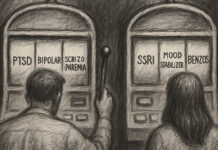Science Under Pressure, Humanity at Stake: An Interview with John Ioannidis
The Stanford professor behind the most famous paper in modern medicine warns that much of today’s research is unreliable, yet insists the project is worth defending.
When Validation Becomes Avoidance: The Hidden Costs of Comfort in Modern Therapy
Each week, her therapist offered affirmations and reassurance. Her eating disorder remained comfortable and unchallenged.
A Call for Retraction: How a Journal Condoned Psychedelic Therapy Abuse
The concealing of relevant data from a research project is a form of fraud and the grounds for retraction of the JHP study.
Therapy in the Age of Self Management and Public Abandonment: A Conversation with Psychological...
Talia Weiner discusses how conservative politics and market logic reshape mental health care.
Confessions of an Advertising Writer: What I Learned From Your Stories—And Mine
Apologies won’t undo the harm. What I’ve learned might. The current system will not change unless we organize.
Confessions of an Ad Writer: How I Helped Turn Atypical Antipsychotics into a Billion-Dollar...
How we redefined schizophrenia, rewrote the safety narrative of antipsychotics, and helped drive one of the most successful (and concerning) pharmaceutical launches in history.
The 110-Year “Schizophrenia Genetic Research” Train Wreck
The “genetics of schizophrenia” area of research is currently in disaster mode and awaits its endpoint.
Locura en Argentina
Editor Alan Robinson aims to provide readers with a magazine that represents them and the “mad cultures” found in Argentina.
Welcome to the Psychiatry Casino
Modern psychiatry is still, in many ways, closer to educated gambling than science. And patients deserve to know that.
Researchers Criticize Putting Preschoolers on Stimulant Drugs
Against guideline recommendations, preschoolers were often prescribed stimulants without even having the chance to try family behavioral therapy.
Like a Refuge and Like a Prison
From Mad in Puerto Rico: Laura López-Aybar interviews Francisco about psychiatric hospitalization.
Is Dialogue the Best Medicine? A Conversation With Jaakko Seikkula
Jaakko Seikkula joins us on the MIA podcast to discuss how Open Dialogue came to be, the research that shows its positive outcomes, how psychiatry has failed to learn from Open Dialogue practice and more.
W.H.O. and U.N. Join Calls to Transcend the Medical Model
From Psychology Today: It will be harder for die-hard defenders of the medical model to dismiss such organizations as the UN and the WHO as extremist, anti-psychiatry radicals.
Beliefs that Create Madness
We know that it is not simply a chemical imbalance or a broken brain. We know how the context plays a large role.
No Subgroup of Patients for Whom Antidepressants Are Effective
A reanalysis of STAR*D finds no support for the theorized subgroup of patients who do well on antidepressants.
A Place in the Forest: Mental Well-Being from a Wider Perspective
The whole social system as it is now is not designed with the purpose of well-being. Where has this gotten us?
Antidepressants in Pregnancy—Turning a Blind Eye, Again
You might think that telling women about the potential risks of taking antidepressants during pregnancy would be uncontroversial.
How to be a Critical Psychologist Without Losing Your Soul: A Conversation With Zenobia...
On the Mad in America podcast, Zenobia Morrill, José Giovanni Luiggi-Hernández and Justin Karter join us to explore the need to raise awareness of psychological approaches that challenge mainstream perspectives.
The New Opium of the People: Why Our Mental Health Sector Has Failed
From iai News: By sweeping the social causes of distress into the private corners of self, our mental health sector has helped stifle collective and community action.
Mad in (S)pain
A Q&A with the team members who edit and run Mad in (S)pain: "There must be a radical change in the way mental suffering is understood and cared for."
Mad in Puerto Rico
Since Puerto Rico is, in essence, a colony of the United States, colonialism has a heavy impact on mental health and the healthcare system.
Seclusion, Restraint and Coercion: Abuse ‘Far Too Common’ in Mental Health Services Across the...
From The Telegraph: The WHO has called for 'considerable' changes in countries of all income levels, citing widespread use of forced admission and treatment; manual, physical and chemical restraint; physical, verbal, psychological and sexual abuse; and unsanitary living conditions.
Why Psychosis Is Not So Crazy: A Conversation with Stijn Vanheule
Vanheule urges clinicians to listen for the structure in psychotic thought. He offers clinical examples that reframe hallucinations as a form of creative response to unspeakable dilemmas.
Suicide Hotlines Bill Themselves as Confidential—Even as Some Trace Your Call
Every year suicide hotline centers covertly trace tens of thousands of confidential calls, and police come to homes, schools, and workplaces to forcibly take callers to psychiatric hospitals.
The Psychological Totalization of Experience: Objectification and Subjectivity
I must be a mechanistic, predictable unit, in order for a psychiatric label or a psychological variable to be implemented on me smoothly.
































